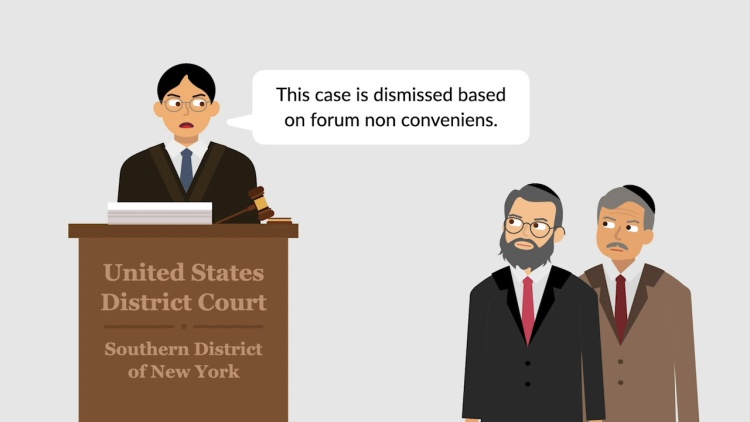Sussman v. Bank of Israel
United States Court of Appeals for the Second Circuit
56 F.3d 450, cert denied, 516 U.S. 916 (1995)
- Written by DeAnna Swearingen, LLM
Facts
Sussman and other founders, directors, and shareholders (plaintiffs) of an Israeli bank were sued in Israel for negligence and breach of duty. The plaintiffs hired Nathan Lewin, a New York lawyer, to represent them in the matter. Lewin sent letters to several Israeli officials and the Bank of Israel (BOI) (defendants), threatening to sue in New York if the pending matters were not settled. Lewin suggested that the suit would bring negative publicity and deter foreign investment in Israel. BOI refused to settle, and Lewin sued in the United States District Court for the Southern District of New York on June 17, 1991. BOI moved for dismissal on the ground of, among others, forum non conveniens. The plaintiffs objected, arguing Sussman could not litigate in Israel for fear of being detained. The court granted the motion without prejudice to the merits, conditioned upon written assurances that Sussman would not be detained and the defendants’ waiver of any Israeli statute of limitations defenses. The defendants then moved for sanctions on Lewin under Rule 11 of the Federal Rules of Civil Procedure (FRCP), the court’s inherent power, and 28 U.S.C. § 1927. The court levied sanctions of $50,000 under Rule 11 and its inherent power, “based solely” on “the [plaintiffs’] manifestly improper purpose” in filing the complaint. Lewin appealed to the United States Court of Appeals for the Second Circuit. The defendants’ cross-appealed to increase the sanction amount.
Rule of Law
Issue
Holding and Reasoning (Kearse, J.)
What to do next…
Here's why 905,000 law students have relied on our case briefs:
- Written by law professors and practitioners, not other law students. 47,100 briefs, keyed to 995 casebooks. Top-notch customer support.
- The right amount of information, includes the facts, issues, rule of law, holding and reasoning, and any concurrences and dissents.
- Access in your classes, works on your mobile and tablet. Massive library of related video lessons and high quality multiple-choice questions.
- Easy to use, uniform format for every case brief. Written in plain English, not in legalese. Our briefs summarize and simplify; they don’t just repeat the court’s language.





